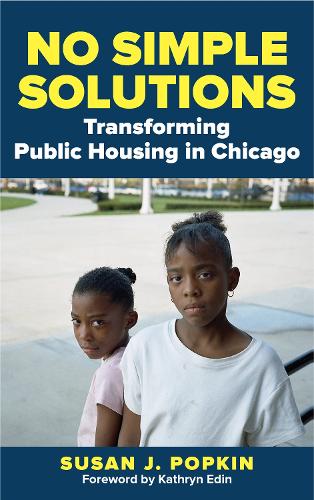
No Simple Solutions: Transforming Public Housing in Chicago
(Paperback)
Available Formats
Publishing Details
No Simple Solutions: Transforming Public Housing in Chicago
By (Author) Susan J. Popkin
Foreword by Kathryn Edin
Bloomsbury Publishing PLC
Rowman & Littlefield Publishers
1st November 2017
United States
Classifications
Professional and Scholarly
Non Fiction
Central / national / federal government policies
363.20977311
Physical Properties
Paperback
160
Width 152mm, Height 229mm, Spine 12mm
245g
Description
In this book, Sue Popkin tells the story of how an ambitiousand riskysocial experiment affected the lives of the people it was ultimately intended to benefit: the residents who had suffered through the worst days of crime, decay, and rampant mismanagement of the Chicago Housing Authority (CHA), and now had to face losing the only home many of them had known. The stories Popkin tells in this book offer important lessons not only for Chicago, but for the many other American cities still grappling with the legacy of racial segregation and failed federal housing policies, making this book a vital resource for city planners and managers, urban development professionals, and anti-poverty activists.
Reviews
All things considered, this is an important book that comprehensively and critically documents Chicagos Plan for Transformation. It is a valuable book for anyonescholars, practitioners, policymakers, community organizations, and studentsinterested in these important housing policies. * Journal of Urban Affairs *
The book does a great job in presenting cutting edge social research, while tracing the remarkably important role that the author (who has over 30 years of experience studying CHA residents) and her colleagues played in shaping the social service component of Chicagos public housing transformation. . . Because No Simple Solutions represents the first major book on the conditions of HOPE VI relocatees, I recommend it to housing scholars and practitioners on both sides of the Atlantic. * Journal of Housing and the Built Environment *
Applied sociologist Popkin presents vivid snapshots portraying the lived experiences of individuals, families, and neighborhoods impacted by public housing policies and revitalization efforts. In 1999, Chicago embarked on an ambitious venture: to rid the city of distressed and deteriorating public housing developments and their accompaniments, including crime, failing schools, crumbling infrastructures, and failed dreams. Popkin builds on her decades of research in Chicagos public housing developments to answer the fundamental question of what the Plan for Transformation meant to Chicago Housing Authority families. In several longitudinal studies, Popkin and her team of researchers conducted surveys and in-depth interviews with hundreds of families and found that transforming the lives of public housing residents requires a more holistic approach that goes far beyond building new housing developments. Documenting the experiences of hard to house families, Popkin demonstrates the need to combine housing assistance with meaningful services targeted at individual and family needs. A must-read for students, practitioners, and researchers interested in housing policy from the ground up.
Summing Up: Essential. Upper-division undergraduates and above.
No Simple Solutions by Susan Popkin shows that most displaced residents have benefited, but a significant minority has been hurt. The book does a great job in presenting cutting edge social research, while tracing the remarkably important role that the author (who has over 30 years of experience studying CHA residents) and her colleagues played in shaping the social service component of Chicagos public housing transformation. I cannot overemphasize the value of this qualitative research. Unlike other public housing books that end with a gloom and doom scenario, Popkin urges readers to press on and to make incremental improvements. Because No Simple Solutions represents the first major book on the conditions of HOPE VI relocatees, I recommend it to housing scholars and practitioners on both sides of the Atlantic. * Journal of Housing and the Built Environment *
The book is an insightful account Popkins No Simple Solutions is an important addition to this literature. It is essential reading for students, scholars, and practitioners interested in the social and human consequences of mismanaged, underfunded, and neglected public housing, and the complicated challenges of addressing them. * Housing Studies *
Epic and encyclopedic, this vital book illuminates the human drama induced by Chicagos bold Plan for Transformation. Multiple surveys conducted over more than 15 years time, plus vivid in-depth interviews that put skin on the numbers, reveal a remarkable, surprising, and ultimately hopeful story. Award-winning author Susan Popkin delivers an essential read for anyone who cares about how our nation attends to the housing needs of the poor. -- Kathryn Edin, Bloomberg Distinguished Professor, Department of Sociology, Johns Hopkins University
Susan Popkins clear-eyed, succinct, and compassionate book focuses on the children and parents who suffered through the intolerable conditions of Chicagos public housing, and then navigated the complex attempts to transform it. With Popkins unique perspective gained from following families for more than a decade, No Easy Solutions provides a deeply well informed guide to what is needed next. -- Lawrence J. Vale, Ford Professor of Urban Design and Planning, Massachusetts Institute of Technology
This important new book offers a hopeful but unflinching account of one of Americas most ambitious and also misunderstood efforts to transform ghetto poverty in a major city. In this vivid and accessible account, we learn the real impacts on highly disadvantaged parents and their children over timeand what does and does not make a difference in their lives. Sue Popkin is one of our most astute, seasoned, and dedicated observers of vulnerable families in low-income housing. Her new book is required reading." -- Xavier de Souza Briggs, Vice President, Ford Foundation and Professor of Sociology and Planning, Massachusetts Institute of Technology
Author Bio
Susan Popkin is asenior fellow and director of the Neighborhoods and Youth Development initiative in the Metropolitan Housing and Communities Policy Center at the Urban Institute.
